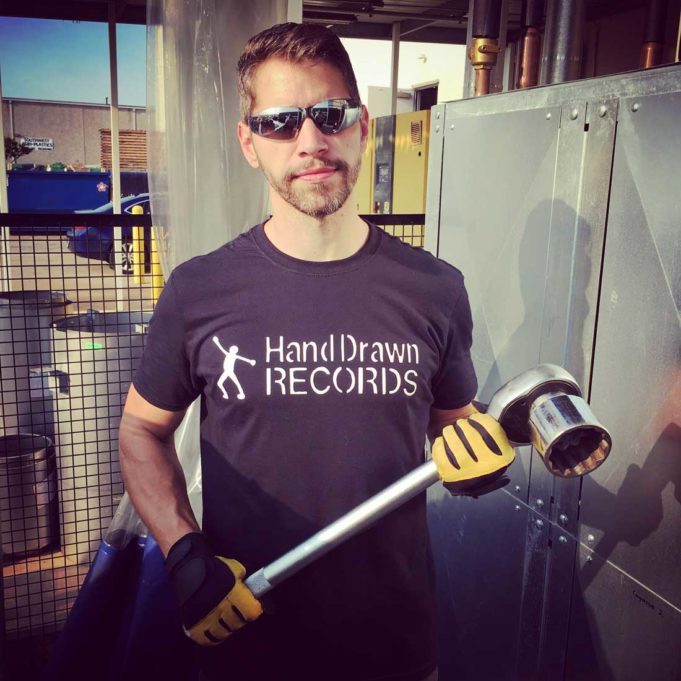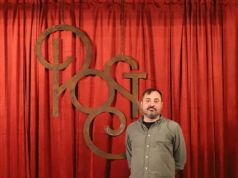Despite the oppressive heat of Texas summers, local bands and national artists alike use this season to throw everything they have behind their most recent recordings. Many musicians often take odd jobs or schedule classes that allow for them to travel this time of year. But the heat isn’t just a danger for the hungover/dehydrated road warriors. It can also be a complete disaster for their cargo: vinyl albums.
Yes, it is 2017, and vinyl is most certainly back. In Dec 2016, the Washington Post, Business Insider, and dozens of other news outlets reported that vinyl is even outselling digital music in the U.K. by almost half a million dollars annually.
In the United States, vinyl sales still account for only a small percentage (roughly 6 percent) of the recording industry’s revenue. Though that’s a small share of the market, Dustin Blocker – chief creative officer and co-owner of Hand Drawn Records and Hand Drawn Pressing, a state-of-the-art record pressing plant in Addison – said the dollar amount is huge and growing.
“Vinyl sales will be around $1 billion in global sales this year,” he said. “And experts say it will climb to around $3 billion in global sales by 2020.”
Hand Drawn’s plant utilizes VirylTech’s Warm Tone record presses and is a pioneering achievement for the vinyl industry. The local trailblazers have even garnered recognition from indie tastemakers like Pitchfork. Its new automation improves upon a classic form by employing modern “computers for brains” technology instead of the ’60s-era tech still utilized in every other plant that’s currently operational in the United States. The result is a way quicker turnaround and a much smaller carbon footprint, with no sacrifice in sound quality.
Even though vinyl records have seen a massive resurgence in recent years, virtually no new plants have cropped up stateside, and the nearly two dozen that already existed, such as United Record Pressing in Nashville, often had waiting times of six months or more. After a certain point, they simply wouldn’t take new orders at all.
“When we decided to open up the plant, we already had Hand Drawn Pressing as a brokerage service to help musicians order their records,” Blocker said. “However, we still were unable to control timelines and quality in the way we would have liked, so opening our own plant made sense. And with all the need around vinyl, and inherent bottlenecks, we also thought it was the best way to shine a spotlight on our artists and our incredible North Texas music scene.”
As an owner of Dreamy Life Records, I can tell you firsthand, the void filled by Hand Drawn’s plant has been crucial. In the short time they’ve been open, we have already pressed and released Siberian Traps’ Indicator and Pearl Earl’s self-titled album in a timeline that would have been virtually impossible last year.
For audiophiles, vinyl is the preferred physical format (despite a cassette resurgence in younger scenes). And though you may be able to hawk CDs at shows, they simply do not move off the shelves – a trend companies as big as Target and Amazon have even acknowledged, with the former now setting aside shelf space for LPs that used to be reserved for compact discs, and the latter just launching its own vinyl store.
Music fans are unpredictable. The recording industry has tried and failed for years to understand the market and stay ahead of the trends. When digital stores like iTunes launched in the early 2000s, the entire industry was shaken. Record companies had no idea how to cope with the calculations of digital sales. Naturally, they’ve spent the past 16 or years or so trying to catch up. And while streaming services like Spotify and Tidal seem to be where most fans listen to their music these days, these companies still struggle to make substantial profits. All the while, record plants are operating at full capacity.
“Digital is perfect,” Blocker said. “Humans are not. It seems intuitive that we’d be drawn to things that are more like ourselves.”
Perhaps the physical nature of sound vibrating through the air into our eardrums isn’t enough for everyone. Many fans still just want something they can hold … you know, like a friend or lover. For better or worse, vinyl is back.
Cameron Smith is the principal singer-songwriter for the Fort Worth post-punk band War Party and performs as a solo artist under the pseudonym Sur Duda. Smith also is a co-founder and owner of Dreamy Life Records and Music, LLC, a Fort Worth-based record studio, store, and label.












